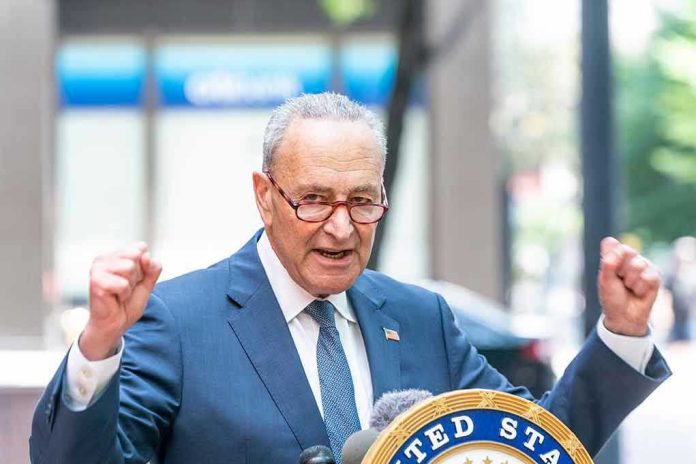
In the 23rd day of a grinding government shutdown, the Senate’s refusal to pay America’s troops and federal workers is less about dollars and more about the raw, exposed nerve of political power—leaving the nation’s defenders and civil servants as hostages in a high-stakes game that’s redefining the rules of the American experiment.
Story Snapshot
- The Senate rejected both Republican and Democratic bills to pay federal workers and troops during a historic government shutdown.
- Over 1 million federal workers, including military personnel, remain unpaid as the standoff deepens.
- Selective executive payroll actions by the Trump administration are raising legal and ethical questions.
- The prolonged shutdown is eroding trust in government and stretching national security agencies to the brink.
Senate Deadlock Ensures Pain for Troops and Federal Workers
On October 23, 2025, as the Capitol’s corridors emptied for the weekend, the Senate delivered a two-fold rejection: first, to a Republican-led bill promising pay only for troops and essential federal employees; second, to a Democratic proposal to pay everyone, furloughed or not. With neither side blinking, Congress left over a million government workers and military families unpaid, many staring down missed mortgages, car payments, and grocery bills. The political standoff now enters its 23rd day, with both parties wielding paychecks as leverage in a high-stakes policy war. The decision is not just political theater—it is a seismic event, echoing through kitchen tables, military bases, and federal offices nationwide.
Republican senators, led by Ron Johnson of Wisconsin, pushed the Shutdown Fairness Act to guarantee pay for those still working—think soldiers, TSA agents, and border patrol. Democrats countered with a broader measure to pay all federal employees and prevent layoffs. Both camps accused the other of political brinkmanship. Three Democrats broke ranks to support the GOP bill, but it fell short of the 60 votes needed. The Democratic bill fared no better. Neither side gave an inch, and as senators dispersed, the impasse solidified into a national crisis. The House, led by Speaker Mike Johnson, remained conspicuously absent, refusing to reconvene, further ratcheting up pressure on the Senate and signaling a vacuum of leadership when it matters most.
Executive Payroll Maneuvers Spark New Debates
President Trump’s administration, meanwhile, sidestepped the deadlock by cherry-picking which federal workers get paid. Pentagon funds went to military payroll on October 15, but civilian employees, law enforcement, and even some frontline homeland security staff remain in limbo. Critics warn these selective moves break with tradition, undermining the principle that all civil servants deserve equal treatment. Constitutional scholars and labor leaders alike are sounding alarms—if future administrations follow suit, the shutdown playbook will never look the same. The precedent set here is not just about paychecks; it’s about executive power and the future of labor relations in the federal workforce.
Federal workers, living paycheck to paycheck, now face the specter of missed rent and mounting debt. Essential services stagger under the weight: air traffic controllers, border security, and law enforcement agencies are stretched thin, while the public absorbs the shock of delayed services and shuttered offices. Morale plummets with every day of uncertainty. Lawmakers and judges, shielded by constitutional protections, continue to draw their salaries, fueling public outrage and deepening the sense of injustice. The question of fairness is no longer theoretical—it’s operational, existential, and personal for those left without pay.
Long-Term Fallout: Trust, Precedent, and Political Reckoning
This shutdown, already one of the longest in U.S. history, threatens more than wallets—it is corroding trust in the government itself. Bipartisan deals of the past are distant memories, replaced by mutual recrimination and a willingness to let the crisis fester for political advantage. Labor economists warn of ripple effects: as federal workers cut spending, local economies falter and national productivity slips. The Bipartisan Policy Center bluntly states that selective payroll actions undermine federal morale and unity. The political calculation is clear—each side hopes to pin the blame on the other, but the electorate, especially the millions directly impacted, may remember this pain far longer than any talking point.
Some Republican lawmakers frame their approach as fiscal responsibility, arguing that only those who work should be paid during a shutdown. Democrats and labor advocates counter that a government’s first duty is to its people, especially those asked to serve and sacrifice. Neither narrative fully answers the gnawing anxiety of families on military bases or the frustration of airport workers keeping the skies safe for travelers. The shutdown’s legacy may be measured not only in missed paychecks but in the erosion of public faith in institutions that once seemed untouchable. As the days drag on, one fact remains: in this standoff, the American worker is the collateral damage, and the endgame is nowhere in sight.



